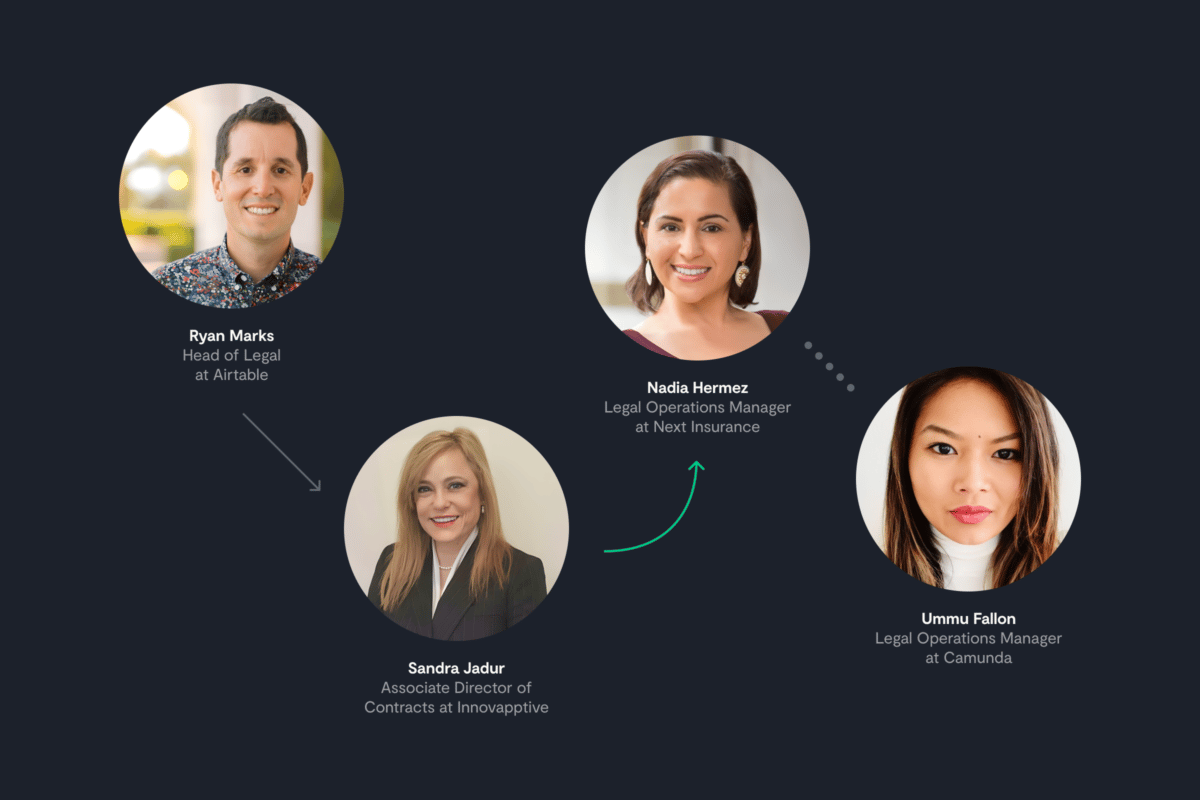If we do our job well, then the company will make better decisions and the company will have success in the future. And I think for me personally, the company having success is the key to my personal growth.
Thumbtack’s Ben Lazar has the power leap from one issue to another in 15-minute segments, across teams.
To start, could you just tell me a little bit about your origin story? So like what do you do and how did you find yourself at SDC today?
Yeah, so I joined Thumbtack a little over three years ago, I was at a big law firm prior to that, doing corporate work. And one of the major problems that Thumbtack had, that I was charged with fixing, which was identified during the interview process, was contract management. Not only did they like not have contracts stored in a useful way, they didn’t even have most of the contracts stored…like they were in somebody’s email. And when you had to go find them, you never could.
So it was like a clear pain point for them, so as soon as I started at Thumbtack I started working on finding the right vendor for that. And I don’t know that we were actually looking at—we weren’t really seeking out as comprehensive of a solution as Ironclad, really—what we were more focused on is storage. But partly because we realized that in order to have good storage, you need to have a way of getting all the contracts in there. We realized that a good pre-signature tool would like help tremendously with that.
So yeah, we ended up deciding on Ironclad, and I sort of was the main person setting everything up. Building out all our workflows, the first one of which we did was the vendor workflow, and then we went from there and built our sales agreements into it. Agreements for marketplace trust and safety NDAs. We have a lot in there now.
It does feel like a chicken or the egg situation, do you start with storage or start with creation….
We have a rule at Thumbtack: that if you've signed something, it needs to be approved in Ironclad first.
Right. Yeah, I mean, the key for us is, we have a rule at Thumbtack, generally that if you’ve signed something, it needs to be approved in Ironclad first. And I think it’s important to have simple rules to follow. And rules that you can put into one or two sentences so that you can get them across the entire company without them being like, “This is too long. I’m not reading this.” And so that helps us capture everything. And make sure all the right approvals get in place. And we do end up with a full set of contracts nicely stored with all the information we want on the on the back end.
We love to hear that: if it’s a contract, it should be in ironclad. We have the same rule internally.
It works 99% of the time.
Hopefully we can get to 100. Could you share a little bit more about what a typical day looks like for you?
Yeah, I do work across a ton of teams. And so honestly, my days are usually sort of jumping from issue to issue in 15-minute segments.
That’s how I know you used to be a corporate lawyer, everything in billable 15-minute segments.
Yeah, thankfully, I don’t need to bill anymore. But if I did, I would have a bunch of like, point 1.1 point 1.1. Yeah, so like, you know, it’s everything from responding to random one-off questions like, “Hey, I’m going to interview somebody, do I need to tell them I’m recording them?” to reviewing a difficult contract, to reviewing a new product design. It’s somewhat frenetic and all over the place, but in a good, organized way.
Do you have a favorite type of work that you do? What do you work on where you think “Oh, I’m really excited to dig into this?”
My favorite type of work is probably when I get to involve multiple members of the legal team. Usually, we all have our own silos that we’re working in. But sometimes stuff will hit cross functionally. So we might have a difficult issue where there is a marketplace trust and safety concern. There is an HR concern, there’s a policy concern. And all of a sudden, rather than just working on something by myself, I have about four really smart teammates involved. And we’re bouncing ideas off each other. And yeah, that’s super fun. Kind of rare, but super fun.
What does success look like for you in your role? How do you know that you’re doing a good job?
Yeah, good question. Honestly, I view success in my role as the company having success, it’s very hard to like distill down little wins. Especially because a lot of what we’re doing is smoothing information asymmetries; our job is not to say yes or no, or that’s too much risk is too little risk. Rather, it’s to properly explain the risk and have our business leaders price it into their decisions and make good decisions. And if we do our job well, then the company will make better decisions and the company will have success in the future. And I think for me personally, the company having success is the key to my personal growth.
That question can be particularly hard for legal to answer because you’re doing a good job when nothing bad happens. Proving out the negative is like, well, you know, we didn’t get sued, or this didn’t happen.
And sometimes it is okay, for bad stuff to happen. You know, sometimes the right answer is to take a risk. And if even if that risk materializes into some sort of harm, it doesn’t mean it was the wrong decision. It’s just a fact, and may even have been the best decision despite the consequences. But what’s important is that you can look back and say, we looked at this carefully, we did the right work, and we came to an efficient decision.
Sometimes it's okay for bad stuff to happen...sometimes the right answer is to take a risk.
What is top of mind for you right now? What’s the biggest priority for you and your team?
One thing that’s really top of mind for me is culture. Maintaining our culture. We have a really fabulous—I know, it’s a cliche to say—but we really do have a fabulous culture. People get along really well, people are happy in their jobs. And we’re growing super fast. Right now, we’re probably going to almost double our headcount this year. And it’s not easy to do that while maintaining the culture. First of all, because if you hire too fast, you’re just hiring the wrong people. And second of all, especially being remote right now, you’re not going to have close personal connections with 1,000 new employees, as you would with employees you’ve been working with for years. So as a leader, it’s very important for me to be contributing to that working, and definitely not contributing to it being more of a challenge than it needs to be.
Is there anything that you’ve implemented on your team for culture continuity?
For me personally, it’s just being very careful and thorough about hiring, really taking the time. Hiring can be a huge burden on your time, and especially if you’re already super busy, it can be very difficult to carve out 25% of your week to focus on hiring. But if you don’t do that, if you look at it as a secondary objective, you will harm your culture over time. You need to take the time to do full a full interview process, involve good smart people throughout the company, and then repeat this process. Take time to do reference checks. All those things that if you cross your Ts and dot your Is, eventually you end up with good people. And those people are actually additive to the culture rather than a risk to it.
That’s most things in business and in life. A little bit of time takes a little bit more effort but pays off. Is there anything that you can share that’s next for you in regards to Ironclad? A new workflow you want to build or…?
We’ve hired a really great contracts lawyer, and we have a fabulous paralegal. And now that we’re a little more staffed up, what I’d really like to do is to take a step back from everything we’ve built so far, and figure out both how we can improve what we built, and how we can build new workflows that could further support the business. And goes hand in hand with us growing more—what are the areas where, now with increased scale, it’s worth automating. For example, our partnerships team: if you’re going to have a certain type of partnerships in a given year, it’s probably not worth getting that into Ironclad and automating it. But if you’re gonna start to do, say, 510, and maybe of all of those, you’re actually sending out 20 to try to initiate the conversation, yeah, probably is worth putting in Ironclad. As we grow, we have to figure out where’s the scale threshold getting to that it’s worth taking the initial investment towards automation.
Implementing a CLM, or actually building any sort of business process is the same as like, when should you plant like an apple tree? 20 years ago. For a business process, it’s like, when should you implement it? Before it’s a problem.
One strategy for a company that’s struggling with that is, do what Thumbtack did with me, which is hire somebody, and then have them do this immediately. Before they get caught up in a million other things people are going to want them to be doing. Have this be their one priority for the first six months of their job, and then the dividends will pay off down the line. Otherwise, it’s far too easy to kick the can down the road. And just be like, I have 100 emails that I need to respond to. I’ll just do the Ironclad setup work next week. Yeah. And I’ll just do it next week. And then next week…we all know that work.
I do have one more question for you, but it’s my favorite question. What did you want to be when you were growing up? What was the first job you wanted to have?
I wanted to be a ski racer, really. I was a pretty scary serious ski racer. When I was a teenager, super cool, but it didn’t quite work out. Partly because of injuries and partly because I felt the need to go be an adult. Yeah. But I was very into that.
Now you can live out part of that dream in Utah.
It’s definitely a dream.
That’s so cool. Okay, well, thank you for ending with that!
Ironclad is not a law firm, and this post does not constitute or contain legal advice. To evaluate the accuracy, sufficiency, or reliability of the ideas and guidance reflected here, or the applicability of these materials to your business, you should consult with a licensed attorney. Use of and access to any of the resources contained within Ironclad’s site do not create an attorney-client relationship between the user and Ironclad.



